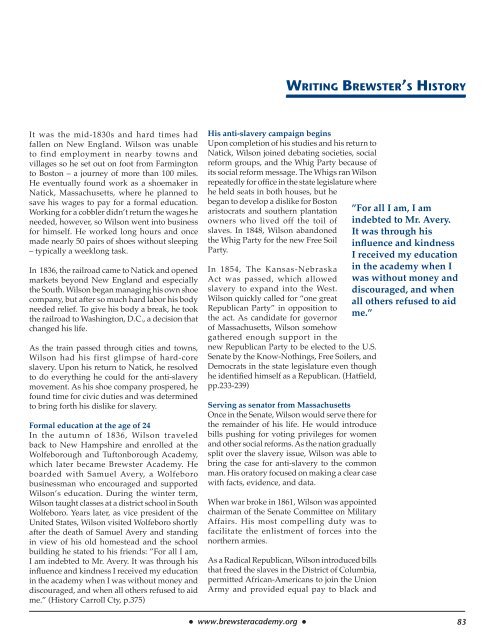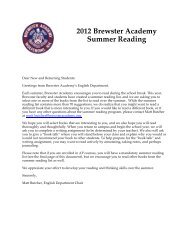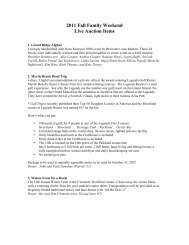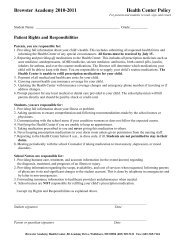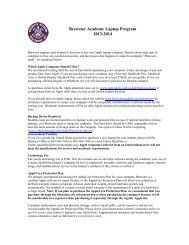BrewsterConnections - Brewster Academy
BrewsterConnections - Brewster Academy
BrewsterConnections - Brewster Academy
You also want an ePaper? Increase the reach of your titles
YUMPU automatically turns print PDFs into web optimized ePapers that Google loves.
It was the mid-1830s and hard times had<br />
fallen on New England. Wilson was unable<br />
to find employment in nearby towns and<br />
villages so he set out on foot from Farmington<br />
to Boston – a journey of more than 100 miles.<br />
He eventually found work as a shoemaker in<br />
Natick, Massachusetts, where he planned to<br />
save his wages to pay for a formal education.<br />
Working for a cobbler didn’t return the wages he<br />
needed, however, so Wilson went into business<br />
for himself. He worked long hours and once<br />
made nearly 50 pairs of shoes without sleeping<br />
– typically a weeklong task.<br />
In 1836, the railroad came to Natick and opened<br />
markets beyond New England and especially<br />
the South. Wilson began managing his own shoe<br />
company, but after so much hard labor his body<br />
needed relief. To give his body a break, he took<br />
the railroad to Washington, D.C., a decision that<br />
changed his life.<br />
As the train passed through cities and towns,<br />
Wilson had his first glimpse of hard-core<br />
slavery. Upon his return to Natick, he resolved<br />
to do everything he could for the anti-slavery<br />
movement. As his shoe company prospered, he<br />
found time for civic duties and was determined<br />
to bring forth his dislike for slavery.<br />
Formal education at the age of 24<br />
In the autumn of 1836, Wilson traveled<br />
back to New Hampshire and enrolled at the<br />
Wolfeborough and Tuftonborough <strong>Academy</strong>,<br />
which later became <strong>Brewster</strong> <strong>Academy</strong>. He<br />
boarded with Samuel Avery, a Wolfeboro<br />
businessman who encouraged and supported<br />
Wilson’s education. During the winter term,<br />
Wilson taught classes at a district school in South<br />
Wolfeboro. Years later, as vice president of the<br />
United States, Wilson visited Wolfeboro shortly<br />
after the death of Samuel Avery and standing<br />
in view of his old homestead and the school<br />
building he stated to his friends: ”For all I am,<br />
I am indebted to Mr. Avery. It was through his<br />
influence and kindness I received my education<br />
in the academy when I was without money and<br />
discouraged, and when all others refused to aid<br />
me.” (History Carroll Cty, p.375)<br />
l www.brewsteracademy.org l<br />
writing <strong>Brewster</strong>’s history<br />
His anti-slavery campaign begins<br />
Upon completion of his studies and his return to<br />
Natick, Wilson joined debating societies, social<br />
reform groups, and the Whig Party because of<br />
its social reform message. The Whigs ran Wilson<br />
repeatedly for office in the state legislature where<br />
he held seats in both houses, but he<br />
began to develop a dislike for Boston<br />
aristocrats and southern plantation<br />
owners who lived off the toil of<br />
slaves. In 1848, Wilson abandoned<br />
the Whig Party for the new Free Soil<br />
Party.<br />
In 1854, The Kansas-Nebraska<br />
Act was passed, which allowed<br />
slavery to expand into the West.<br />
Wilson quickly called for “one great<br />
Republican Party” in opposition to<br />
the act. As candidate for governor<br />
of Massachusetts, Wilson somehow<br />
gathered enough support in the<br />
new Republican Party to be elected to the U.S.<br />
Senate by the Know-Nothings, Free Soilers, and<br />
Democrats in the state legislature even though<br />
he identified himself as a Republican. (Hatfield,<br />
pp.233-239)<br />
Serving as senator from Massachusetts<br />
Once in the Senate, Wilson would serve there for<br />
the remainder of his life. He would introduce<br />
bills pushing for voting privileges for women<br />
and other social reforms. As the nation gradually<br />
split over the slavery issue, Wilson was able to<br />
bring the case for anti-slavery to the common<br />
man. His oratory focused on making a clear case<br />
with facts, evidence, and data.<br />
When war broke in 1861, Wilson was appointed<br />
chairman of the Senate Committee on Military<br />
Affairs. His most compelling duty was to<br />
facilitate the enlistment of forces into the<br />
northern armies.<br />
As a Radical Republican, Wilson introduced bills<br />
that freed the slaves in the District of Columbia,<br />
permitted African-Americans to join the Union<br />
Army and provided equal pay to black and<br />
”For all I am, I am<br />
indebted to Mr. Avery.<br />
It was through his<br />
influence and kindness<br />
I received my education<br />
in the academy when I<br />
was without money and<br />
discouraged, and when<br />
all others refused to aid<br />
me.”


